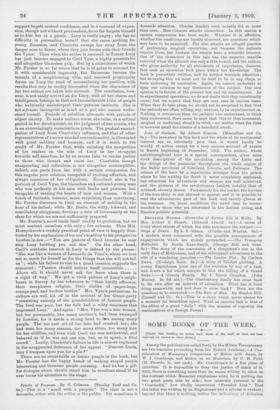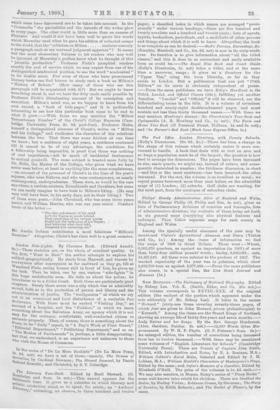SOME BOOKS OF THE WEEK.
[Under this headivo too 'laic.. such Book, of the week as halm not beers merited for review in other forms.1 Among the publications called forth by the Milton Tercentenary are two tractates proceeding from the British Aoademy,—A Con- sideration of Macaulay's Comparison of Milton with Dante, by W. J. Courthope, and Milton as an Historian, by C. H. Firth (IL Frowde, Is. net each). Mr. Courthope's is a fine piece of criticism. It is impossible to deny the justice of much of it. Still, there is something more than he seems willing to allow in the contrast which Macaulay emphasises when ho is putting the two great poets side by side ; how intensely personal is the "Commedia," how wholly impersonal "Paradise Lost." That the latter was written by an Englishman and a scholar is evident.; beyond this there is nothing, unless the iudicatious of Arianism
which some have discovered are to be taken into account. In the "Commedia " the partialities and the hatreds of the writer glow in every page. The other world is little more than an annexe of Florence. And would it not have been well to quote the words Which Macaulay used when he gave his edition of collected essays
to the world, that the "criticism on Milton coattails scarcely a paragraph such as my matured judgment approves" ? It seems but the most elementary fairness to let readers who may well be ignorant of Macaulay's preface know what he thought of this " juvenile production." Professor Firth's pamphlet renders exactly the sort of service which we may expect from one of his distinguished academical position, to use the word " academical " in its double sense. Few even of those who have pronounced literary tastes can find leisure to study such a book as Milton's "History of Britain." (How many of those who see this paragraph will be acquainted with it ?) But we ought to know Something about it, and we have the duty made easily possible by Professor Firth's illuminating account of its conception and execution. Milton's mind was, as we happen to know from his own record, a "hook of title-pages," and it is profoundly interesting to see how this particular book came to be and to what it grew.—With these we may mention the "Milton Tercentenary Number" of the Christ's College Magazine (Cam- bridge University Press, 2s. 8d. post-free). Professor Hales, himself a distinguished alumnus of Christ's, writes on " Milton and his College," and vindicates the character of the relations between the two. That there was some friction at one time we know ; but a residence of eight years, a residence continued till it ceased to be of any advantage, the conditions for a fellowship being impossible, is proof that there was nothing of real importance,—not to speak of incidental testimonies to mutual goodwill. The same subject is treated more fully by Dr. Pelle, the Master of the College, who gives what we have never seen before, at least in anything like the same completeness, —an account of the personnel of Christ's in the time of the poet's sojourn, who were Fellows, and who were contemporary, or nearly contemporary, undergraduates. These were, as would be the case anywhere, a curious mixture, Roundheads and Cavaliers, but some we can easily imagine to have been to Milton's liking. (He may very well have boon, in his early days, not to their liking.) Two of them were poets,--John Cleveland, who was some three years junior, and William Harries, who was one year senior. Crashaw wrote of the latter :- " The ripe endowment of his mind
Left his Yenres so much behind, That numb'ring of his virtues' praise Death lost the reckoning of his Dam;
And believing whet they told. Imagined him exceeding old."
Mr. Austin Dobson contributes a most felicitous " Miltonic Exercise." Altogether, Christ's has risen well to a groat occasion.













































 Previous page
Previous page